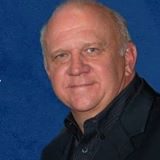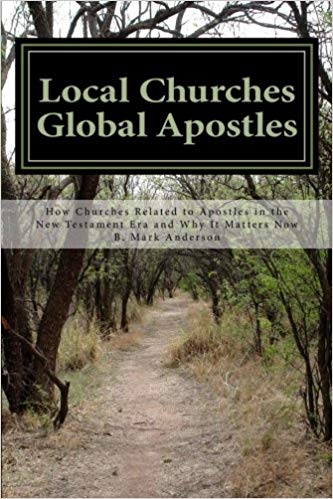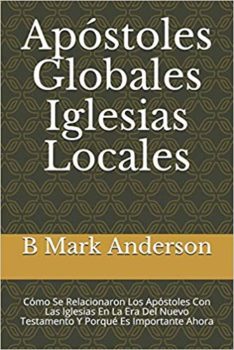
Ken Malone Apostolic Church
4 Trademarks of a New Testament Apostolic Church
Publisher’s note: Ken Malone is being used by God to mobilize the body of Christ throughout Florida and the nation. After being a pastor for 24 years, Ken has recently stepped down from a pastoral position which has allowed God to launch Ken into his apostolic role. He is an ordained minister and serves as the founder of Forerunner School and Ministry, Inc. and serves on the board of Dutch Sheets Ministries. Ken also serves as one of the leaders of Network Ekklesia International, an Apostolic Network founded by Dutch Sheets. Ken walks in a governmental apostolic mantle that releases the body of Christ into their destiny. He also ministers with a prophetic, seer anointing which enables him to identify activate and release redemptive gifts in individuals, churches and cities. (If you’re wondering, “What is an apostle?” click here.)
These four things signify what a New Testament Apostolic church should look like.
The role model the Lord left us for the church is found in the book of Acts. He didn’t leave any other model. Today our congregation life is filled with programs and clutter that remove us from being a book of Acts people.
Trademark: A distinctive feature or characteristic that serves to identify the maker or originator.
Wow, what a definition. Now let’s look at some of the characteristics that identify our Maker:
1. Outpouring of His Spirit – Acts 2 released the promise of Joel that His Spirit would be poured out on all. It is God living in us and among us. He puts His life inside us, and through that life, we converse and have relationship with the Father, Son and Holy Ghost. And it shall be in the last days, God says, “That I will pour forth of My Spirit upon all mankind” (Acts 2:17), God loves relationship. How are you relating to Him? Begin again to talk to God and read His Word. His life will ignite within you.
2. Signs, wonders, miracles and healing – At the gate Beautiful, a man who was lame from His mother’s womb was miraculously healed. This marked the beginning of miracles through the hands of the apostles. It is a trademark left to us so that we would also operate in the miracle-working ministry of Christ. Miracles are the marks of a New Testament Apostolic Church. The signs of a true apostle were performed among you with all perseverance, by signs and wonders and miracles (2 Cor. 12:12).
3. Dreams, visions and the prophetic – Do you dream with the Lord? Did you know the Lord dreams? He releases His dreams, visions and prophetic word to His people. I have spent most of my life going after the voice of the Lord. Even to this day I long to hear Him speak. Acts 2 marks us as a people, when filled with the Holy Ghost will have visions, dreams and prophetic words.
“And your sons and daughters shall prophesy, and your young men shall see visions and your old men shall dream dreams” (Acts 2:17, MEV).
I was sharing a dream with Lou Engle, and he said to me, “Follow the dream, follow the dream.” That’s the way the book of Acts church operated—not through programs, but through dreams, visions and the prophetic word. Dream again! Ask the Lord to give you His dreams, visions and prophetic word. (Note: True prophetic words, dreams and visions will be within the integrity of God’s written word.)
4. Harvest – This is a signpost to us. In Acts 2, the results of His Holy Spirit being poured out was 3,000 souls coming to the Lord through believing in Him. It happened again in Acts 3 with the results of 5,000 coming to the Lord through the Lord healing the man at the Beautiful Gate. Let’s raise the bar. This is the mark of revival. Several years ago, a lady asked me to attend the revival meetings going on at their church for the last 30 days. I was interested in what was going on, so I asked, “What’s happening?” She said, “Many are being blessed and touched by God.” Then I asked, “Any souls being saved?” She responded, “No.”
They were being renewed, which we all need, but this is not what I call Awakening. Recently, there have been thousands saved in Williamson, West Virginia. This began a little over a month ago when a no-name evangelist by the name of Matt Hartley from Tennessee came into Williamson for a three-day meeting but the meetings just kept going.
Revival broke out, however, when the evangelist spoke in the school and thousands of students were saved. Pastor Mitch Bias, with the regional Church of God in Delbarton, said prayer, plus desperation, has paved the way for this spiritual breakthrough, especially among the young people. Now that’s the trademark I’m looking for.
Let’s lead someone to Jesus, whether it’s 1 or 1,000. It’s a sign of real revival.
Publisher’s note: These 4 foundational aspects of a New Testament apostolic church plus much more are included in my book — Local Churches Global Apostles: How Churches Related to Apostles in the New Testament Era and Why It Matters Now






